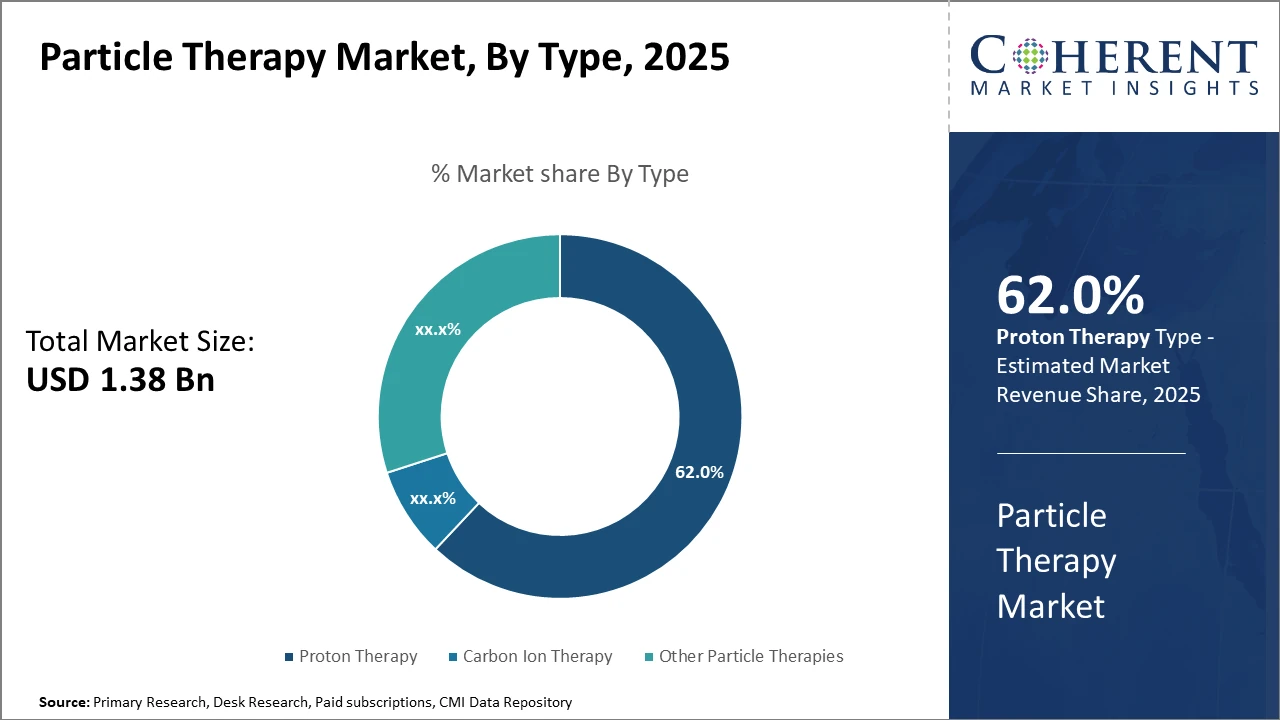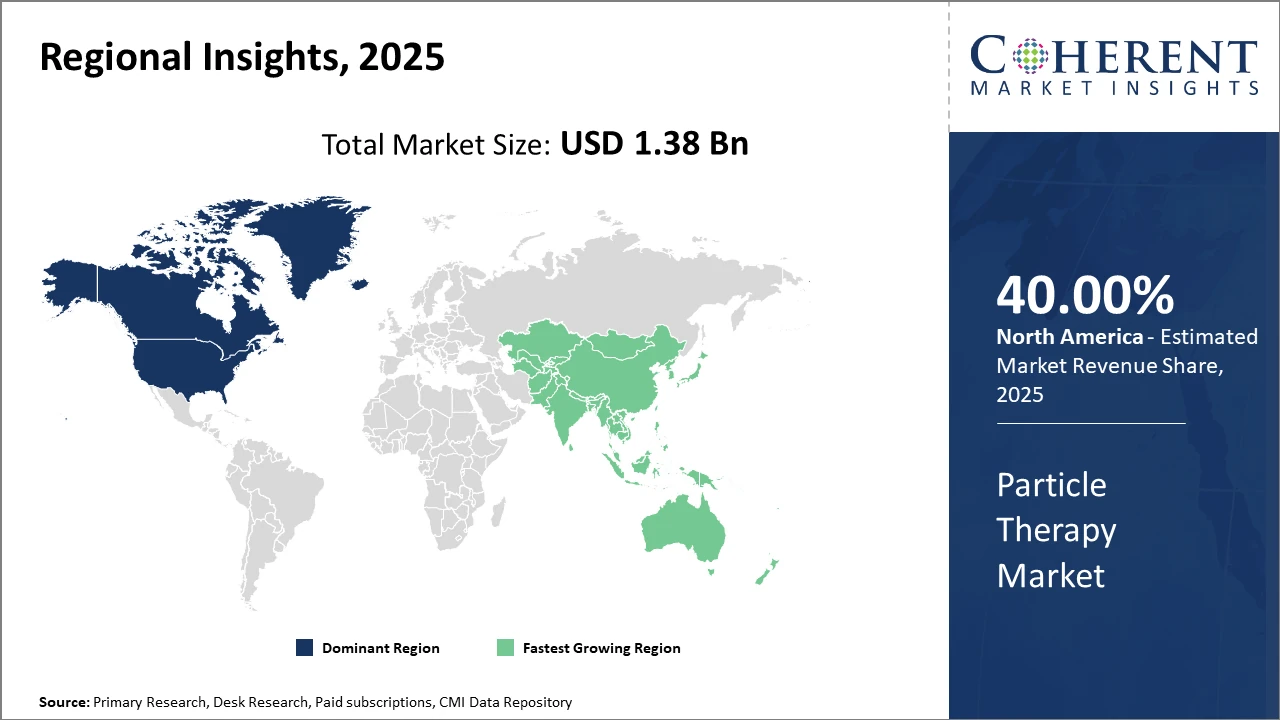Particle Therapy Market Size and Forecast – 2025 – 2032
The Global Particle Therapy Market size is estimated to be valued at USD 1.38 billion in 2025 and is expected to reach USD 3.45 billion by 2032, exhibiting a compound annual growth rate (CAGR) of 13.7% from 2025 to 2032.
Global Particle Therapy Market Overview
Particle therapy systems are advanced radiation treatment platforms that use protons or heavy ions to target cancerous tumors with high precision. These products consist of particle accelerators, beam delivery systems, imaging components, and treatment planning software. Particle therapy allows for controlled dose delivery with minimal damage to surrounding healthy tissues, making it particularly suitable for pediatric cancers and tumors located near critical organs. The systems are highly complex, requiring sophisticated engineering, shielding, and control mechanisms to ensure accuracy and patient safety.
Key Takeaways
Proton Therapy leads the particle therapy market segment, commanding over 60% of market share due to widespread clinical adoption and technological maturation.
Oncology remains the dominant application segment, reflecting the increasing industry size driven by rising cancer incidences globally.
North America holds the largest market share, benefiting from superior healthcare infrastructure and reimbursement frameworks. Asia Pacific exhibits the fastest CAGR, fueled by expanding healthcare capacity and government support.
Equipment providers emphasizing modular and cost-effective systems are witnessing accelerated business growth, reshaping market dynamics.
Particle Therapy Market Segmentation Analysis

To learn more about this report, Download Free Sample
Particle Therapy Market Insights, By Type
Proton Therapy dominates the market share, capturing roughly 62% due to its widespread clinical use for various cancers and long-established technology platforms. The segment’s superior precision in sparing healthy tissues has made it the therapy of choice for pediatric and head & neck cancers. Carbon Ion Therapy is the fastest-growing subsegment, gaining traction owing to its higher biological effectiveness, particularly in treating radio-resistant tumors.
Particle Therapy Market Insights, By Application
Oncology remains the dominant segment, responsible for over 85% of the market share, driven by the extensive use of particle therapy to treat various cancer types. Innovations enabling precise tumor targeting while sparing critical structures have expanded clinical indications significantly. Neurology and Cardiovascular applications are nascent but showcase promising utility, especially in targeting arteriovenous malformations and cardiac arrhythmias.
Particle Therapy Market Insights, By End-User
Hospitals & Clinics dominate the market share, accounting for the majority of treatments due to their infrastructure capability and clinical expertise. These centers provide comprehensive cancer care with integrated particle therapy services. Research Institutes serve primarily for clinical trials and technology development and represent a smaller market share, but play a critical role in innovation. Ambulatory Surgical Centers are an emerging end-user segment as smaller, more affordable systems facilitate outpatient treatments, enhancing access and market dynamics.
Particle Therapy Market Trends
The market trends in recent years highlight a shift towards personalized and precision oncology care.
Artificial intelligence implementation in treatment planning improved targeting accuracy by up to 10% in pilot programs initiated in 2024, substantially reducing side-effects and enhancing patient outcomes.
Furthermore, the surge in compact proton therapy system deployments diversified market participants and lowered cost barriers, enabling adoption in mid-tier healthcare facilities, especially in Asia Pacific.
Clinical trials integrating particle therapy with immunotherapies signal an evolving market focus toward combination treatments, promising to change cancer care paradigms over the next decade.
Particle Therapy Market Insights, By Geography

To learn more about this report, Download Free Sample
North America Particle Therapy Market Analysis and Trends
In North America, the dominance in the market is evident with over 40% market share, driven by advanced healthcare infrastructure, established reimbursement frameworks, and the presence of key market players like Varian Medical Systems and Mevion Medical Systems. The U.S. alone invested over USD 300 million in particle therapy infrastructure expansion in 2024, facilitating high patient accessibility and supporting market revenue growth.
Asia Pacific Particle Therapy Market Analysis and Trends
Meanwhile, Asia Pacific exhibits the fastest growth, with a CAGR exceeding 16%, propelled by increasing government funding in healthcare, rising cancer prevalence, and the establishment of new particle therapy centers in China, Japan, and India. Companies like Hitachi Ltd. and Toshiba have played crucial roles in technology transfer and localized system manufacturing, boosting regional business growth.
Particle Therapy Market Outlook for Key Countries
USA Particle Therapy Market Analysis and Trends
The USA’s particle therapy market stands as a global leader, propelled by considerable investments in proton and carbon ion therapy infrastructure. Leading cancer centers such as MD Anderson Cancer Center and Mayo Clinic expanded particle therapy offerings in 2024, contributing to a 14% increase in treatment volumes. Favorable reimbursement policies and robust R&D investments continue to underpin technological innovation and market growth, with companies like Varian Medical Systems spearheading advanced delivery systems and AI integration.
Japan Particle Therapy Market Analysis and Trends
Japan's market reflects significant growth driven by government health initiatives aimed at integrating carbon ion therapy into standard cancer treatment protocols. Institutions such as the National Institute of Radiological Sciences extended their particle therapy capabilities in recent years. Hitachi Ltd.’s innovations in compact particle therapy equipment have facilitated accessibility in regional medical centers, spurring increased adoption and reinforcing the country’s leadership in carbon ion therapy treatments.
Analyst Opinion
Supply-side indicators reveal that the installation of new particle therapy centers has surged by over 25% worldwide between 2023 and 2024, directly contributing to market capacity expansion. For example, in 2024, several new centers were commissioned across Asia Pacific, boosting therapeutic availability and market revenue.
Demand-side factors show a steady increase in oncology patient preference for proton and carbon ion therapies due to their reduced side effect profiles. Clinical data from 2024 demonstrate a 15% year-over-year growth in proton therapy treatment cases in North America, signaling strong adoption rates aligned with market growth.
Pricing dynamics indicate optimization as several manufacturers introduced modular and cost-efficient gantry systems in 2024, lowering upfront costs for new facilities. This pricing shift is instrumental in driving demand in emerging markets, particularly in Latin America and Asia Pacific, where upfront expenditure had previously limited expansion.
Market dynamics are also influenced by insurance coverage expansions across Europe and North America, enhancing patient access to particle therapies. Data from recent health policy reforms in Germany and the U.S. highlight an increase of up to 20% in reimbursable cases, lifting market share for particle therapy modalities in these regions.
Market Scope
| Report Coverage | Details | ||
|---|---|---|---|
| Base Year: | 2025 | Market Size in 2025: | USD 1.38 billion |
| Historical Data for: | 2020 To 2024 | Forecast Period: | 2025 To 2032 |
| Forecast Period 2025 to 2032 CAGR: | 13.7% | 2032 Value Projection: | USD 3.45 billion |
| Geographies covered: |
|
||
| Segments covered: |
|
||
| Companies covered: | Varian Medical Systems, Hitachi Ltd., IBA Group, Mevion Medical Systems, Sumitomo Heavy Industries, RaySearch Laboratories, ProNova Solutions, Toshiba Corporation, ViewRay, Inc | ||
| Growth Drivers: |
|
||
Uncover macros and micros vetted on 75+ parameters: Get instant access to report
Particle Therapy Market Growth Factors
The proliferation of cancer cases globally remains a primary market driver, with WHO data indicating an increase in new malignancy cases surpassing 19 million in 2024. This epidemiological trend drives demand for precision therapies like particle therapy, delivering superior outcomes. Technological innovation is another major growth driver; breakthroughs in beam delivery systems, such as pencil beam scanning, have improved treatment precision and reduced side effects, fostering market expansion. Healthcare infrastructure development, specifically in emerging economies like India and China, supported by government incentives, has improved accessibility, stimulating demand. Furthermore, enhanced reimbursement policies across North America and Europe have reduced patient costs, accelerating adoption rates and market revenue growth.
Particle Therapy Market Development
In 2024, Leo Cancer Care launched the world’s first upright photon therapy system, introducing a patient-centric approach that allows cancer treatments to be delivered in seated or standing positions. The innovation improves patient comfort, enables more flexible beam angles, and has the potential to enhance treatment precision while reducing setup complexity in radiotherapy workflows.
In 2025, Thailand’s Bangkok Dusit Medical Services (BDMS) announced plans to launch a proton therapy center dedicated to treating complex cancers, strengthening the country’s advanced oncology infrastructure. The initiative aims to improve access to highly targeted, low-toxicity radiation therapy, positioning BDMS as a regional hub for next-generation cancer treatment in Southeast Asia.
Key Players
Leading Companies of the Market
Varian Medical Systems
Hitachi Ltd.
IBA Group
Mevion Medical Systems
Sumitomo Heavy Industries
RaySearch Laboratories
ProNova Solutions
Toshiba Corporation
ViewRay, Inc.
Notably, Varian Medical Systems executed strategic partnerships with major hospitals across the U.S. in 2024, significantly enhancing its footprint in the proton therapy segment and leading to an estimated 30% surge in service contracts. Hitachi Ltd. invested in modular particle accelerator designs, reducing capital expenditures for clients in Asia Pacific and increasing adoption by nearly 18% in the region in 2024. IBA Group expanded its global service network, improving maintenance and customer support—key factors in retaining market leadership and enhancing revenue streams.
Particle Therapy Market Future Outlook
The future outlook for the market is positive as precision oncology gains importance in cancer treatment. Technological innovation aimed at reducing system size, cost, and operational complexity will support wider adoption. Expansion of cancer care infrastructure and increasing government and private investments in advanced oncology treatments will drive market growth. Continued clinical validation and improved accessibility are expected to position particle therapy as a key component of next-generation cancer care.
Particle Therapy Market Historical Analysis
The particle therapy market originated from advances in nuclear physics and radiation oncology, initially confined to a small number of research institutions due to high infrastructure and operational costs. Early clinical adoption was slow, as healthcare providers relied on conventional radiation therapies. However, growing clinical evidence demonstrating superior precision and reduced damage to healthy tissues increased acceptance. Over time, particle therapy became a preferred option for treating pediatric cancers and complex tumors, strengthening its clinical credibility and market presence.
Sources
Primary Research Interviews:
Radiation Oncologists
Medical Physicists
Oncology Center Administrator
Equipment Suppliers
Clinical Researchers
Databases:
WHO Cancer Statistics
IAEA Radiation Data
OECD Health Data
Magazines:
Oncology Times
Medical Physics International
Cancer Today
Healthcare Global
Pharma Intelligence
Journals:
International Journal of Radiation Oncology
Physics in Medicine & Biology
Radiotherapy and Oncology
The Lancet Oncology
Medical Physics
Associations:
American Society for Radiation Oncology
International Atomic Energy Agency
European Society for Radiotherapy and Oncology
WHO
National Cancer Institute
Share
Share
About Author
Komal Dighe is a Management Consultant with over 8 years of experience in market research and consulting. She excels in managing and delivering high-quality insights and solutions in Health-tech Consulting reports. Her expertise encompasses conducting both primary and secondary research, effectively addressing client requirements, and excelling in market estimation and forecast. Her comprehensive approach ensures that clients receive thorough and accurate analyses, enabling them to make informed decisions and capitalize on market opportunities.
Missing comfort of reading report in your local language? Find your preferred language :
Transform your Strategy with Exclusive Trending Reports :
Frequently Asked Questions
Select a License Type
Joining thousands of companies around the world committed to making the Excellent Business Solutions.
View All Our Clients